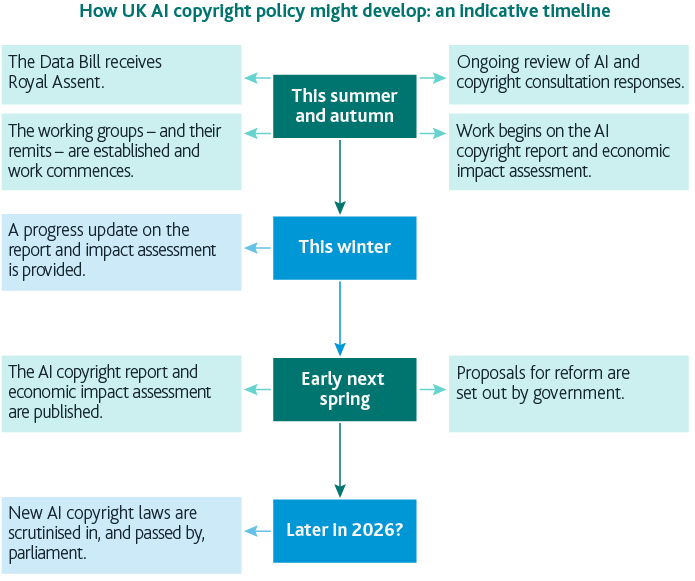Fresh talks between AI developers and content creators, designed to inform “next steps” in the formulation of new UK policy on AI and copyright, have taken place in London.
The discussions on Wednesday, facilitated by the UK government, reflect the latest in a timeline of anticipated actions relating to UK AI copyright policy and follows impassioned debate within parliament on the topic earlier this summer.
The government said the talks represent the beginning of work of new “expert working groups”, which are designed to find “practical, workable solutions” to resolve differences that currently exist between how AI developers and content creators think UK policy on AI and copyright operates now and how they believe it should operate in future.
Many content creators, such as publishers, authors and musicians, are concerned that AI developers are using their copyright works, without permission, to train their AI models and inform the output those models produce. They want greater transparency over when AI developers seek to use their content as well as more control over whether to enable access to it – and, if so, to be remunerated in return. They argue that existing copyright protections in UK law are being ignored by AI developers and want the government to intervene.
AI developers, however, reject assertions that their activities are copyright infringing. They want the government to loosen, not tighten, restrictions on access to data and point to the potential of AI to deliver improved economic, social, health and environmental outcomes as the prize on offer for supporting AI development.
The government has said it wants to balance the respective interests. It opened a consultation last year exploring options for AI-related copyright reform with that objective in mind.
However, the ‘opt-out’ based system of reform that the government indicated its preference for at the time sparked alarm among the creative industries lobby. Some parliamentarians subsequently tried to force the government to add AI-related copyright protections to new data laws that were passing through parliament earlier this year. The government successfully resisted that pressure, amidst its desire to look at AI-related copyright policy reforms holistically, but some amendments were added to the now enacted Data (Use and Access) Act that provides for related actions in accordance with a statutory timetable. The new expert working groups are expected to input to this process and inform the actions to be taken.
One working group is expected to explore the issue of transparency in relation to AI training, while another is expected to explore potential technical solutions that enable rights holders to control when their works are used by AI developers.
The government is currently reviewing the responses it received to its AI and copyright consultation, which closed in February. It has previously said the consultation attracted more than 11,500 responses. The government is due to prepare an economic impact assessment on the options for reform, as well as a report on the use of copyright works in the development of AI systems, in the coming months. The report must include proposals in relation to various AI-related copyright issues. There is cross-over between those issues and the ones the new expert working groups are expected to discuss.
Attempts by the previous UK government to broker a deal between AI developers and content creators on a voluntary AI copyright code of practice failed, after talks broke down.
Intellectual property law expert Gill Dennis of Pinsent Masons said: “While it is important that all viewpoints in the debate are represented and heard, working groups have been tried before and failed to agree on a way forward. The government will do well to avoid a similar impasse resulting again.”

According to the government, representatives of Amazon, Meta and OpenAI, as well as News Media Association, the Publishers Association, The Guardian, Sony Music Entertainment, and the Alliance for IP, were among those involved in Wednesday's talks.
The first round of meetings was expected to contribute towards the finalising of terms of reference for how the groups will operate going forward. The government said the initial focus of the discussions is on “the impacts, opportunities, and common ground in the AI and copyright debate, with their work then helping to inform next steps following the conclusion of the government’s consultation”.
Technology secretary Peter Kyle and culture secretary Lisa Nandy chaired the first round of meetings of the new expert working groups.
Kyle said: “I am determined to harness expert insights from across the debate as we work together to deliver a solution that brings the legal clarity our creative industries and AI sector badly need in the digital age. Today’s meeting and the formation of these expert working groups will continue to ensure all voices can be heard so we can reset and refocus on how we can deliver precisely that. The work we’ll be taking forward in the coming months will ensure we can work in partnership to deliver a fresh start for creatives and AI developers alike.”
Nandy said: “We have heard loud and clear the concerns from the creative industries around AI and copyright and these roundtables will give us another chance to consider the best way forward. We have committed to ensuring a copyright regime that values and protects human creativity, can be trusted and unlocks new opportunities for innovation across the creative sector and wider economy.”
Latest News
Editor's Pick
OUT-LAW ANALYSIS

Getty Images v Stability AI: why the remaining copyright claims are of more than secondary significance
15 Jul 2025


